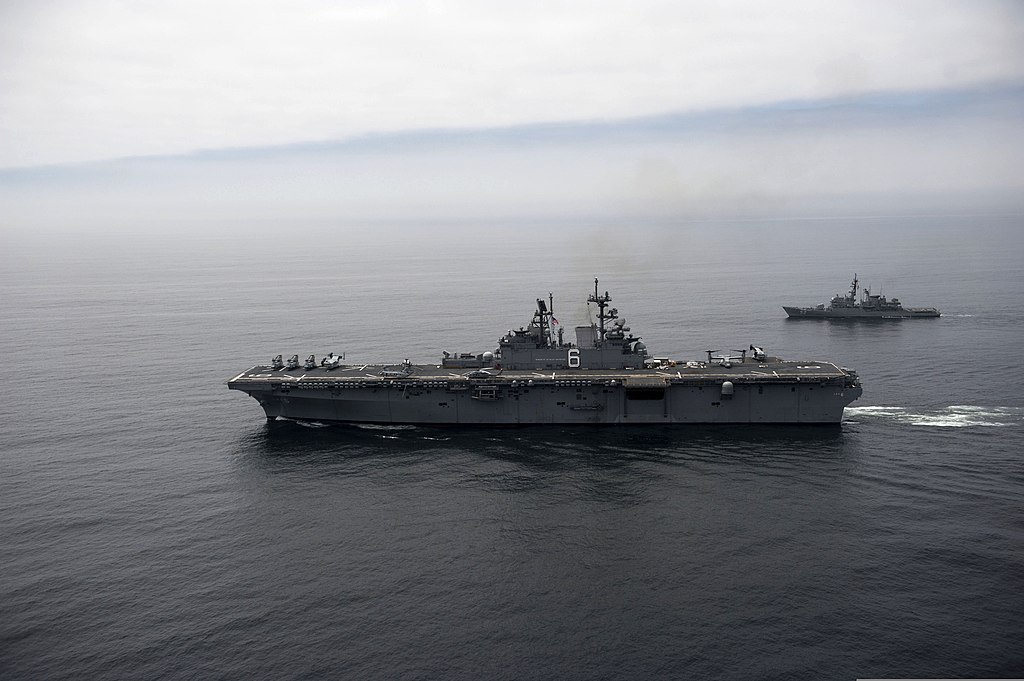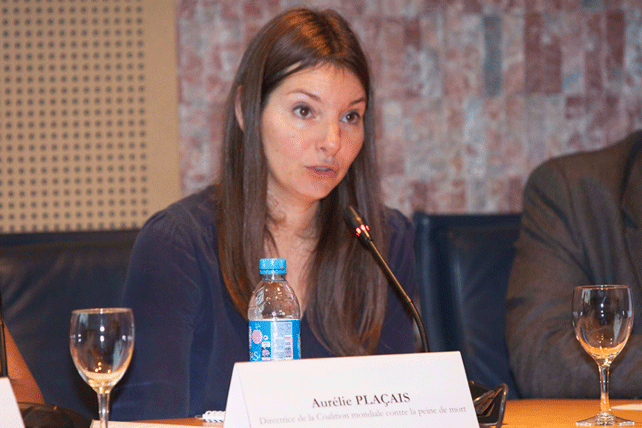Hellraiser. Red Dawn. Ghostbusters. And now the war on drugs – another crap 80s reboot nobody asked for.
In the past few weeks, four US Navy warships carrying 2,200 marines, plus one nuclear submarine, have set sail for the south Caribbean sea off the coast of Venezuela. These forces are deployed as an American show of force against Venezuelan President Nicolás Maduro, whom the White House branded a “narco-terrorist” for his alleged involvement with the Cartel of the Suns, an alleged cabal of coke-dealing generals named after the insignia worn by the Venezuelan top brass.
While Donald Trump once called the war on drugs unwinnable and for all substances to be legalised, he’s used his second term in office to channel his inner Ronald Reagan and George Bush Sr. He’s now sending the full might of America’s war machine against its southern neighbours in an attempt to stop teenagers getting stoned.
A “cartel” by name
It’s true that certain Venezuelan generals and officials work with Colombian guerillas to facilitate cocaine shipments at the highest level; the country has even become a minor producer of the drug. But experts say that Trump’s mission against Venezuelan drug cartels won’t be straightforward: the Cartel of the Suns doesn’t actually exist in the formal sense the Mexican cartels do, and Maduro is in no way leading it.
“The Cartel of the Suns is a name that was created 10-15 years ago by journalists as a sort of shorthand to refer to the fact that the Venezuelan military are involved in drug trafficking,” explained David Smilde, a professor of sociology and an expert in Venezuela at Tulane University in New Orleans.
“But there’s nobody who would say, ‘hey, I’m part of the Cartel of the Suns.’ There are different networks and groups within the military involved in drug trafficking; oftentimes it’s indirect involvement, like permitting it to happen. There is no real cartel.”
In response to Trump’s threats, Maduro has called on the national militia to mobilise to defend the homeland. Venezuela is also dispatching its own warships to safeguard its waters, as well as 15,000 troops to the Colombian border to combat narcos and guerillas. However, Smilde believes that an American invasion of Venezuela, while not totally ruled out, is unlikely.
“Donald Trump hates the idea of boots on the ground and invasion forces – one of his core values has always been against that kind of military operation,” he said.
“But he rather likes to use air power, missiles and that kind of thing. The Iran missile attack was showing his style. He would use some serious military force, but never go in. No intention of real regime change or trying to fix things on the ground. But maybe some targeted military strikes.”
The great Trump war show
So what’s actually happening? Having ended harm reduction programmes worldwide for being too woke, Trump has to show he’s doing something about the devastating overdose crisis, a core matter for his constituents. Acting spectacularly is great political theatre.
“Another part of this is appeasing his supporters in the Miami Latino community: Cubans, Venezuelans, Nicaraguans… anything that sticks it to Maduro – threats, sanctions – they love that, they eat this up,” added Smilde.
Another aspect, the professor pointed out, was the mass deportation several months ago of Venezuelans accused of being part of Tren de Aragua, once a prison gang turned crime syndicate viciously terrorising the Venezuelan diaspora. Trump has characterised the gang as a national security threat that’s supposedly mounting an “invasion” of the United States. So far, the only territory Tren de Aragua has claimed are a couple of apartment blocks – which is troubling, but not much different than what all-American gangs already do across the country. But the Trump campaign zeroed in on the Tren de Aragua, as well as mythical cat-eating Haitians, to whip up xenophobic sentiment ahead of last year’s elections.
The deportees included Andry José Hernández Romero, a gay makeup artist fleeing homophobia and persecution in his homeland who was thrown in El Salvador’s CECOT prison, a country where he’s never been. The deportation was carried out through the 1798 Alien Enemies Act, which enables law enforcement to ignore due process when dealing with hostile enemy forces within your country.
Outrage erupted, even from Trump supporters like Joe Rogan, when it became clear many of the deportees were not bloodthirsty mobsters, but detained for something so arbitrary as immigration agents misunderstanding tattoos. But provoking an international crisis with Venezuela could give the authorities much more leeway for these deportations.
“I think one important element of the context here is that this whole idea that Nicolás Maduro is at the head of the Cartel of the Suns, and the Cartel of the Suns’ operational arm is the Tren de Aragua” Smilde observed.
“This is something that [Venezuelan opposition leader] Maria Corina Machado and her coalition have been just pushing relentlessly in the media, through direct meetings with senators in the United States, doing their work for them. And so normally this would be sort of absurd and very transparent, but we have a president who lives under his conspiracy theories, and this fits very nicely with his priorities like having the grounds to quickly remove immigrants. The Venezuelan opposition coalition… did an admirable job last year in the elections, but I think what they’ve done this past year with this narrative… They’ve really taken Venezuelan citizens in the United States and thrown them under the bus.”
American law enforcement ramping up
Besides ICE goons rounding up gay Venezuelan makeup artists and giving them a one-way ticket to an El Salvadoran cage, there are other disturbing dynamics at play in the name of protecting Americans’ precious bloodstreams. Since April, government agents no longer need a warrant to eavesdrop on foreigners’ private conversations. Whereas before this was limited to suspected spies and terrorists, now warrantless surveillance applies to drug investigations, too.
Meanwhile, ominously, preparations seem to be in play for some serious intervention to happen in Mexico. Again, even on his campaign trail, Trump made no secret of wanting to strike directly at the cartels smuggling fentanyl over the southern border. But when the commander-in-chief is a master troll who changes his mind on a whim, it’s tricky to tell what exactly of what he says should be taken seriously. Now, the picture is gradually growing clearer.
Since January, the CIA has been flying reconnaissance drones over Mexico – the type typically used to track terrorist targets. And on Thursday, investigative journalist Ken Klippenstein revealed that the US Northern Command is evaluating options for cartel attacks: from blowing apart their safehouses with airstrikes, to bin Laden-style raids with special forces like the Green Berets or Navy SEALS. The plans are due to be presented to Trump in September.
Given the atrocities already committed by Mexican security forces to enforce America’s prohibitionist drug policies, the potential for collateral damage is huge. Mexico’s President Claudia Sheinbaum has already told Trump, in no uncertain terms, that the gringos’ “assistance” in combatting drug trafficking is unwelcome. But whether Trump, who often treats established rules and norms like toilet paper, will listen is a different story.
Read a history book
It’s worth noting that the United States has tried something like this before. In the early 1980s, the Caribbean was a major route for coke-laden speedboats to offload their cargo off the Florida coast. Norman’s Cay, a tiny island in the Bahamas, became a private fiefdom belonging to the Medellín Cartel’s Carlos Lehder, who either bought or forced off all other residents to use the island’s runways to fly cocaine into America. The island was guarded by a militia of heavily-armed German mercenaries patrolling in jeeps. But in 1982, Reagan formed the South Florida Task Force, which used naval blockades to stop the smuggling runs through the Caribbean waters.
This worked, in a sense: the Caribbean stopped being a major cocaine passageway. But this had the side-effect of handing the logistics, and eventually the entire cocaine business, over to the Mexicans who already had a line smuggling heroin and cannabis. And the rest is history.
“As long as you have demand for drugs, well, there’s going to be providers,” Smilde said.
“Because if you crack down on the providers, all it does is raise the price. It just makes it more lucrative. And this is what has happened in the war on drugs in the past 30-40 years. And it’s pretty much been discredited. But we have a president who very much wants to return to some past that he perceives was better than the present. He wants to return to the drug war model. And it won’t work.”


